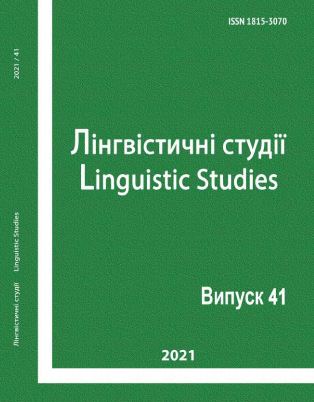Existential Problems Of The Ukrainian And German Languages In The Post-National World
DOI:
https://doi.org/10.31558/1815-3070.2021.41.1Keywords:
language situation; language policy; native language; modern philosophy of multilinguistics; post-national worldAbstract
Today, in the conditions of large-scale integration of the planetary community, many languages have all the chances to be on the periphery of utilization, even though we consider their communicative and economic attractiveness. The reason is in their constant reduction (submergence) – a displacement from important social spheres such as science, education, economics, etc. Unfortunately, the latest linguistics does not have time to respond promptly to these challenges of globalization. Consequently, there is a need for a comprehensive and thorough study of a defined problem for a successful and effective solution.
References
A Europe we can believe in. 2017. Web. 7 Octob. 2017. < https://thetrueeurope.eu>07.10.2017.
Ammon, Ulrich. «Heutige Fachsprachen im interkulturellen Austausch. 1: Die Stellung der deutschenWissenschaftssprachen außerhalb des deutschen Sprachgebiets». [In:] L. Hoffmann, H. Kalverkämper (eds.) Fachsprachen: Languages for special purposes. Berlin; New York: Walter de Gruyter, 1998, Hd. 1, 809–819.
De Swaan, Abram. Words of the Word: The Global Language System. Cambridge: Polity, 2001.
Humboldt, Wilhelm von. «Über den Dualis». [In:] A. Leitzmann (hrsg.) Wilhelm von Humboldts Werke. Berlin: B. Behr's Verlag, 1907, Bd. VI, 4–28.
Humboldt, Wilhelm von. «Über die Verschiedenheit des Menschen Sprachbaues». [In:] A. Leitzmann (hrsg.) Wilhelm von Humboldts Werke. Berlin: B. Behr’s Verlag, 1906, Bd. VI, 111–303.
Jaspers, Karl. Die geistige Situation der Zeit. - 9. Abdr. der im Sommer 1932 bearb. 5. Aufl. Berlin; New York: Walter de Gruyter, 1999.
Jaspers, Karl. Vom Ursprung und Ziel der Geschichte. München; Zürich: R, Piper & Co. Verlag, 1983.
Lüdi, Georges. «Ist Englisch als lingua franca eine Bedrohung für Deutsch und andere Nationalsprachen?» [In:] J. Haselhuber, B.Kellermeier-Rehbein (eds.) Vielfalt, Variation und Stellung der deutschen Sprache. Berlin, Boston: De Gruyter, 2013, 275–292.
Phillipson, Robert. «Myths and realities of «global» English». Language Policy, 16 (3), 2017: 1– 29 16.08.2017.
Rösch, Olga. «Internationalisierung der Hochschulbildung – Und was ist mit Kultur?». Die neue Hochschule, 3, 2013: 70–74.
Rösch, Olga. «Internationalisierung der Hochschulbildung – Was sind unsere Ziele?». Die neue Hochschule, 1, 2015: 18–24.
Trabant, Jürgen. Globalesisch oder was? Ein Plädoyer für Europas Sprachen. München: Verlag C. H. Beck, 2014.
Антонова, Ирина Б. «Коммуникация и язык в транснациональном политическом пространстве Евросоюза». Вестник РГГУ. Серия: Политика. История. Международные языки, 6 (149), 2015: 68–80.
Гриценко, Павло Ю. «Мова як індикатор угорсько-українських відносин». Стратегічні пріоритети, 1 (46), 2018: 28–39.
Гриценко, Павло Ю. «Українська мова сьогодні: політика, практика, сенси». Віче, 15–16, 2014: 47–51.
Дослідження соціологічної групи «Рейтинг». 2018. Web. 22 лютого 2018. 22.02.2018.
Загальнонаціональне дослідження Фонду «Демократичні ініціативи» спільно з соціологічною службою Центру. 2020. Web.10 вересня 2020. 10.09.2020.
Закон України № 2704-VII від 25.04.2019 "Про забезпечення функціонування української мови як державної». 2019. Web. 25 квітня 2019. 25.04.2019.
Масенко, Лариса. «Суспільний запит на українську мову зростає. Влада відстає від народу». 25.11.2017
Ставлення населення України до закону про мову. Дослідження Київського міжнародного інституту соціології (КМІС). 2020. Web.29.07.2020. 29.07.2020.
Указ Президента України № 156/2018 «Про невідкладні заходи щодо зміцнення державного статусу української мови та сприяння створення єдиного культурного простору України». 2018. Web. 31травня 2018. 31.05.2018.


